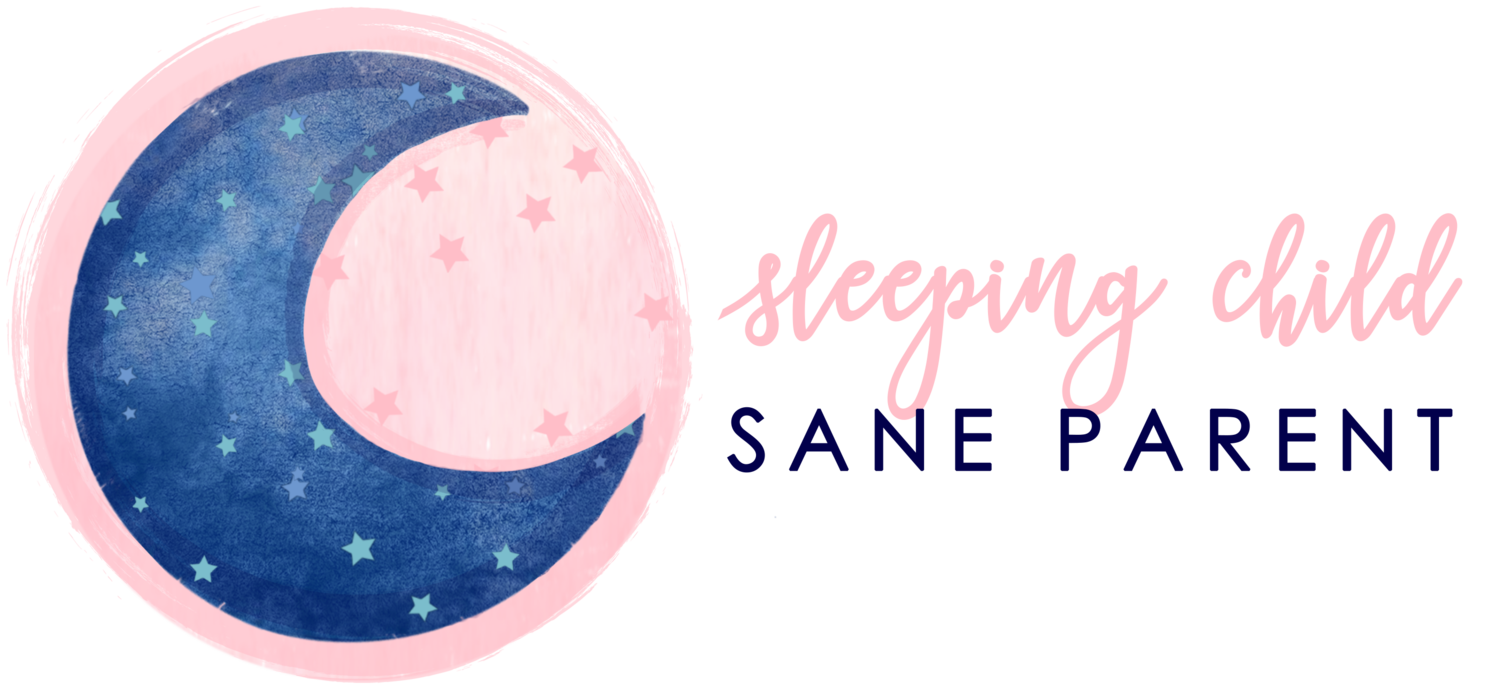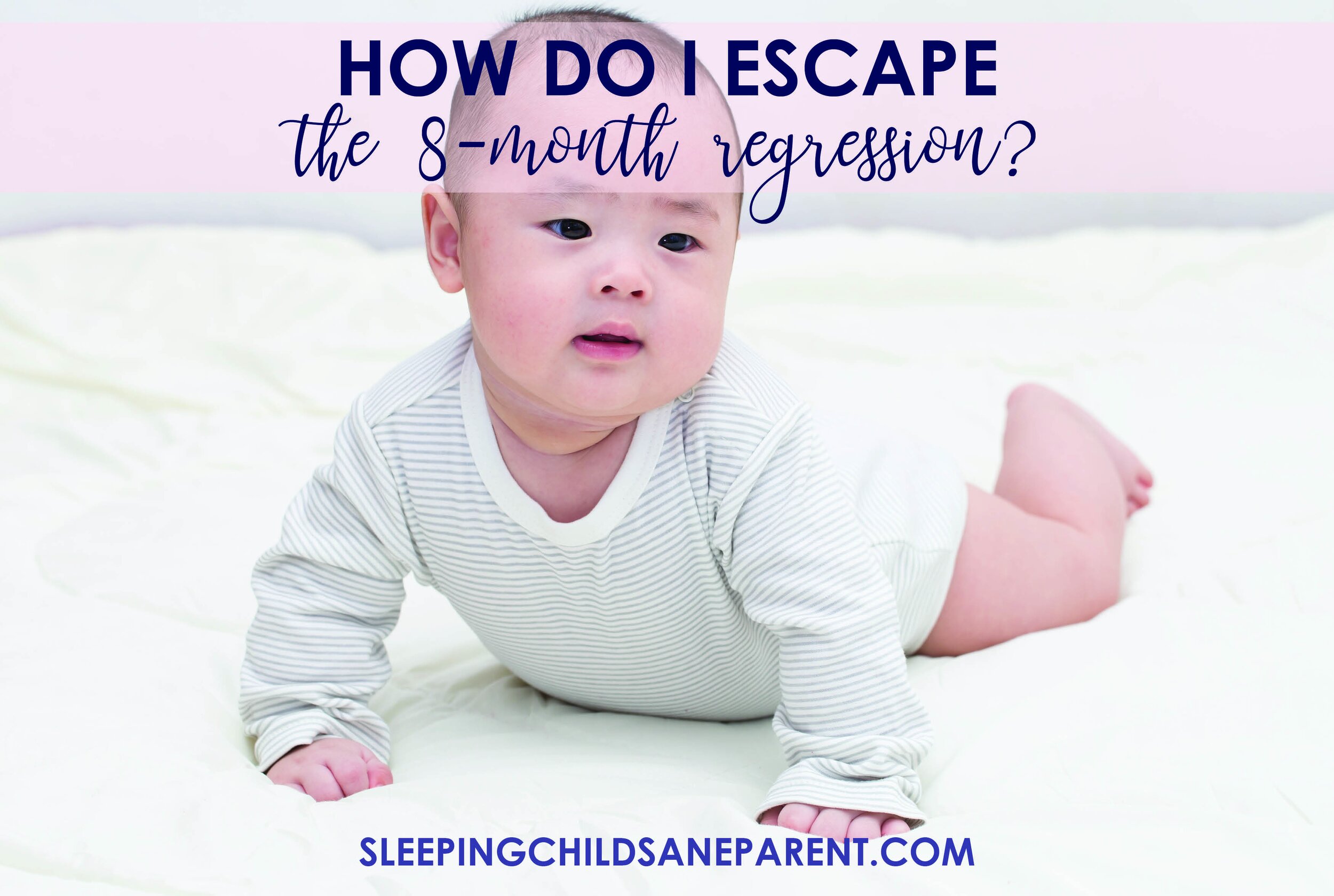I get questions all the time about various sleep regressions, so I decided it’s time to explain them all in a blog mini-series! But first off . . .
What is a Sleep Regression?
When Baby was sleeping well, and now she’s not, she might be going through a sleep regression!
Some regressions are a result of outside factors, and are typically short-lived, unless parents get over-involved. These minor regressions might be caused by teething, moving, or getting a new sibling, to name a few. Click for more information about what to do about these types of regressions.
Other regressions are a result of internal factors, like developmental milestones and/or changing sleep needs. Those are the ones we’ll be discussing in this mini-series.
When does the 8-month regression occur?
All regressions have a number in them, but the regression actually has a little more wiggle room than that.
The 8-month regression typically happens sometime between 8 and 10 months. This regression is often heavily influenced by physical development, so babies who acquire physical skills earlier may regress sooner, while babies who are slower to acquire certain physical skills are more likely to regress later on.
What does the 8-month regression look like?
The 8-month regression is typically characterized by difficulty falling asleep and increased nightwakings. Sometimes babies cry at bedtime or during these nightwakings, while other times they seem to be practicing all their newly learned skills.
What causes the 8-month Regression?
The 8-month regression is generally caused by a few different factors. Baby experiences increases in brain/physical development, separation anxiety, and caloric needs. Simultaneously, Baby often experiences a decrease in sleep due to the 3-2 nap transition. It’s definitely a recipe for regression!
But what does that really mean?
Let’s dive a little deeper into the specifics of how the factors mentioned above can lead to disrupted sleep.
brain development and new physical skills
Around this time, Baby will likely begin scooting, crawling, pulling to stand, and even taking his first steps. Baby will also start to develop more language and make more brain connections about how the world works.
With such an explosion in skills, Baby’s world really begins to open up, and Baby wants to use his new skills as much as possible! That means even when you lay him in the crib or when he wakes in the middle of the night, Baby may want to practice his new skills.
Spike in separation anxiety
Along with the other rapid brain development Baby is undergoing, he’s also becoming more aware of when mom or dad leaves the room, and he’s not always a fan! This can be especially true when mom or dad leaves the bedroom after laying Baby down for sleep.
Increase in calorie needs
With such an increase in brain development and activity, Baby’s calorie needs also increase. Baby needs full milk feeds throughout the day, plus sufficient calories from solids; otherwise, he may wake in the night in attempts to get his needed calories.
Dropping from 3 naps to 2
Baby sees increases in a lot of areas, but sleep is not one of them. By 8-9 months, Baby will drop to two naps, and if the schedule is not adjusted accordingly, Baby may begin to miss out on sleep every single day, leading to overtiredness. In case you haven’t learned this already, overtired babies have a tough time sleeping!
So what can you do?
How to Get Good Sleep Again
If left unchecked, this regression could last a long time! All these changing factors for Baby often cause changes in how we handle Baby’s behavior, and when we change to cater to Baby’s bad sleep, we reinforce bad sleep behaviors. Luckily, there are concrete actions we can take to help with the 8-month regression!
Step by Step
First off, if Baby’s sleep wasn’t great leading up to 8 months, you’ll need more than the following simple tweaks to get things on track. Depending on your baby’s age, my 4-8 month or 9-17 month Dream Keys will teach you what you need to know about setting the stage for good sleep.
If Baby WAS sleeping well and this is truly a regression, here’s what to do.
1 - Give Baby plenty of opportunity to practice his new skills. If Baby is frequently in an exersaucer, wrap, or even car seat, Baby doesn’t get to practice scooting, crawling, or pulling to stand. We want Baby to have plenty of opportunity to practice these skills outside of the crib so that the novelty wears off and so that Baby gets sufficient exercise to be sleepy at the proper times.
2 - Maintain your usual routine for leaving Baby’s room at naptime and bedtime. When we begin to cater to separation anxiety, we reinforce it. If your baby already has the skills of falling asleep independently, he doesn’t all of a sudden need you to help him fall asleep. Give him a loving hug, and then lovingly say goodbye so he can get good sleep.
3 - If you haven’t already, start feeding Baby solids 3x/day — personally, I just start bringing Baby to the table for all our family’s normal meal times. From about 6-7 months, food is more about introduction and exploration. Around one year, Baby ideally begins getting all his calories from normal meals. However, that’s not an overnight change — it happens over the course of that 8-12 month timeframe.
4 - It’s time for a schedule adjustment! I teach that we base bedtime off the last nap, so if the last nap now ends earlier than it used to (because it’s the end of the second nap rather than a third nap), bedtime also needs to be earlier! I go over all the details about this in my 9-17 Month Dream Key.
No regression needs to last forever. Let’s get through the regression together with the help of my Dream Keys or one-on-one consultations, found here.


